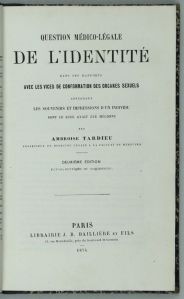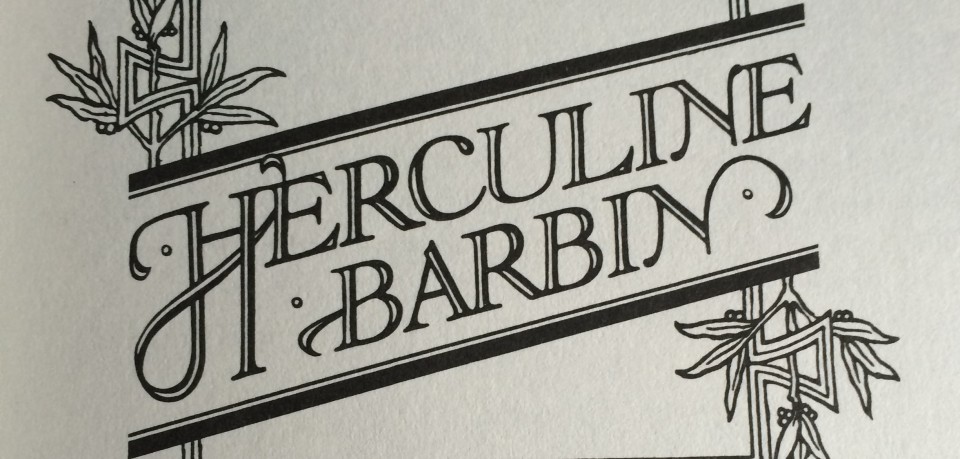My name is Emily and I finished my PhD on translating trans identity in 2018. For my second chapter I explored how to translate intersex identity. And more specifically how to translate the memoirs of Herculine Barbin.
Barbin was born in 1838 and was assigned the female sex at birth. When they entered their early twenties they underwent a physical examination, the result of which was a legal change of sex. In 1868 Barbin, living in Paris as a man, committed suicide. In their memoir (written while Barbin was in Paris), Barbin uses masculine gender when narrating their time as a girl and once they have been reassigned as a man, others still refer to them with feminine grammatical gender.
Barbin’s memoir was first published in a French journal in 1874 by Ambroise Tardieu and entitled ‘Question Médico-Legale de l’Identité dans les rapports avec les vices de conformation des organes sexuels’ (The Medico-Legal Question of Identity in Relation to the Irregular Formation of Sexual Organs) – This will be the source text my translations are based on. The memoir was rediscovered by Michel Foucault and published in 1978 under the title Herculine Barbin dite Alexina B. (Herculine Barbin called Alexina B.). Foucault included his own introduction and medical documents from the time describing Barbin’s ‘condition’.
Tardieu and entitled ‘Question Médico-Legale de l’Identité dans les rapports avec les vices de conformation des organes sexuels’ (The Medico-Legal Question of Identity in Relation to the Irregular Formation of Sexual Organs) – This will be the source text my translations are based on. The memoir was rediscovered by Michel Foucault and published in 1978 under the title Herculine Barbin dite Alexina B. (Herculine Barbin called Alexina B.). Foucault included his own introduction and medical documents from the time describing Barbin’s ‘condition’.
The only published English translation is entitled Herculine Barbin: Being the Recently Discovered Memoirs of a Nineteenth-Century French Hermaphrodite and was translated by Richard McDougall in 1980. This translation does nothing to show Barbin’s use of both masculine and feminine grammatical gender.
To change this, I want to find a strategy that can be radical and yet also recognisable at the same time. This view of trans identity as both normative and non-normative promotes the idea that every body is, to some degree, transgressive and queer, even if one does not identify as trans.
One aim of my project is to promote the visibility of trans people by bringing the translation of trans identities to the fore, especially as it is something that has not gained much theoretical attention. Furthermore, while transphobia exists, a discussion of how to promote trans people as a valuable part of society will always be important. Another aim of my work is to promote translation as a form of activism, as something which is always open to interpretation and which is as creative as ‘original’ writing.
I am exploring the idea of the hypertext which allows for a layered and multiple presentation of the texts. The text is no longer to be mastered, it is an experiment of which individual readings are samples.
I am interested in the kind of hypertext that allows the reader to click on links within the text to be taken to other documents, such as notes further explaining the text, images or the source text. So this blog will create a hypertextual translation of Herculine Barbin.
The source text I will be using for my translation can be found here.

Hey Emily! I am also named Emily and share a last name with Herculine. I’m an artist and came across your blog and would love to talk about your project.
LikeLike
Hi Emily, yeah, it’d be great to discuss it with you, my email is emilylindarose@gmail.com 🙂
LikeLike